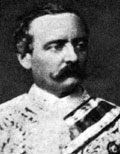Descendant of a German aristocratic family, son of Franz Joseph Fürst zu Hohenlohe-Schillingsfürst; attended gymnasiums in Ansbach and Erfurt (to 1837); studied law in Göttingen, Bonn, Lausanne, and Heidelberg (1837-1841); entered the Prussian administrative service in 1842; passed final examinations in law in 1844; was appointed state councilor for Bayern (1846); as hereditary member of the Bavarian parliament, he supported the demands for creation of the German state and served as envoy to Athens and London during the Revolution of 1848-1849; after the victory of Prussia over Austria, he supported the integration of South Germany into Prussia; became state minister of the royal court and foreign affairs, Chairman in the Council of Ministers of Bavaria (31 Dec 1866 - 7 Mar 1870); stepped down as head of government after a vote of no confidence in the Bavarian parliament on 18 Feb 1870; first Vice-President of the Zollparlament (1868, 1869, 1870); was elected to the Reichstag (1871-1881) as a representative of the Liberal Party (Liberale Reichspartei); served as first Vice-President of the Reichstag (23 Mar 1871 - 15 Jun 1871, 19 Oct 1871 - 1 Dec 1871, 10 Apr 1872 - 19 Jun 1872, 13 Mar 1873 - 25 Jun 1873, 9 Feb 1874 - 26 Apr 1874); supported the Kulturkampf policy of Otto von Bismarck; appointed (2 Mar 1874) the German ambassador to France and participated in the Berlin Congress (1878); briefly served as acting state secretary for foreign affairs (20 Apr 1880 - 16 Oct 1880) and governor of Alsace-Lorraine (1885-1894); in 1894 succeeded General Leo von Caprivi as Reich Chancellor; under his administration Germany accepted the new policy of colonial expansion, which led to the creation of strong navy and affected the relationship with Great Britain; in the domestic policy, a number of restrictions were made against the Social Democrats (SPD); by the end of his tenure lost his political influence and mostly relied on his state secretary for foreign affairs Bernhard von Bülow, who eventually became Reich Chancellor after Hohenlohe's resignation in 1900. Biography sources: [1][2][3] |

